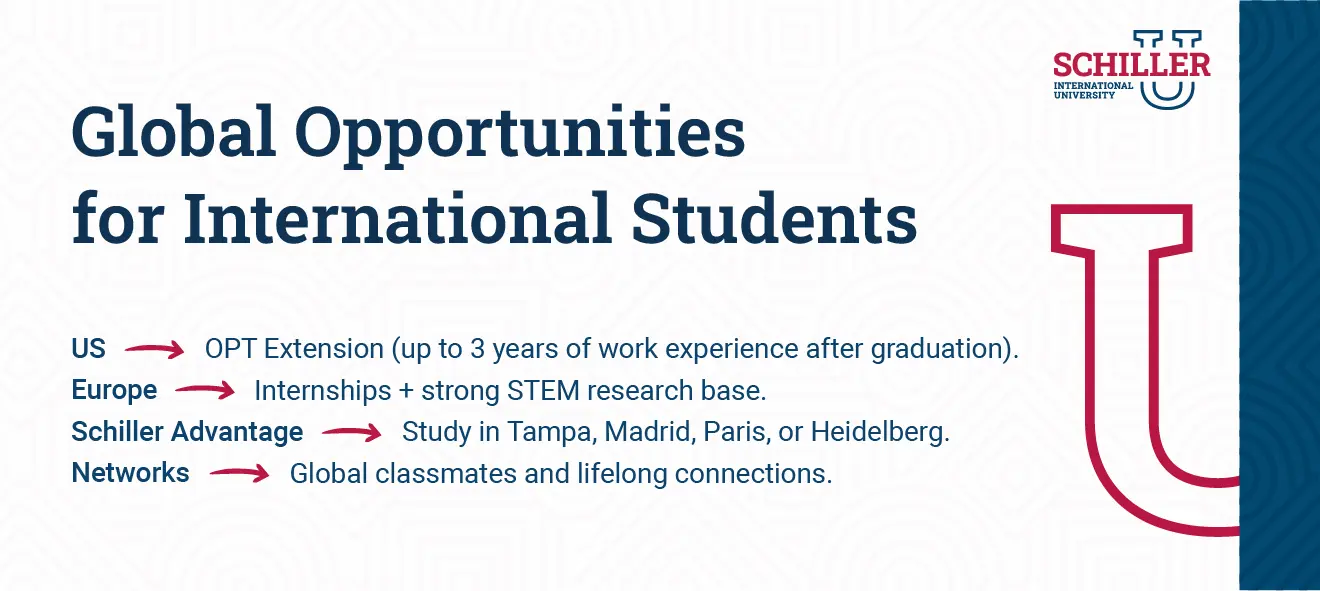A bachelor’s degree in STEM helps you build the foundation. You gain basic technical knowledge and problem-solving ability, the first steps towards a professional career. But for many students, it’s only the beginning. A STEM master’s degree allows you to specialize in niche fields, such as data science, applied mathematics, artificial intelligence (AI), computer science, or sustainability management. At this postgraduate stage, you start applying the concepts you have learned. You may also carry out research and prepare to step into leadership roles.
For international students, the value of a STEM master’s degree goes beyond academics. You will gain access to practical pathways, such as U.S. internship opportunities through Optional Practical Training (OPT) for students on an F-1 visa, and discover global career opportunities across Europe and beyond. This master's degree is more than a credential; it is an investment in advanced knowledge and international experience to help you prepare for future careers with confidence.
10 Key Benefits of a STEM Master’s Degree
A STEM master’s degree will allow you to tap into opportunities that a bachelor’s degree alone may not provide. While an undergraduate program gives you the foundation, a postgraduate program helps you sharpen your expertise.
1. Advanced Specialization in High-Demand Fields
One of the top reasons international students enroll in a STEM master’s degree is to specialize in their desired field. With a master’s degree, you can focus on areas that drive innovation worldwide:
- Data Science and AI: Build advanced skills in machine learning, predictive analytics, and data-driven decision-making.
- Applied Mathematics and Computer Science: Learn to create algorithms and solve advanced computing problems.
- Engineering Fields: Focus on cutting-edge areas such as robotics, systems design, or clean energy technologies.
This advanced specialization signals to employers that you are prepared to solve complex problems, lead projects, and contribute niche skills that few candidates possess.
2. Enhanced Career Prospects and Job Security
A STEM master’s degree will give you an edge in competitive job markets. Employers consistently prefer candidates with advanced technical expertise, making your degree a valuable differentiator.
- High Demand Across Industries: From finance and healthcare to technology and energy, STEM-trained graduates are needed in nearly every sector.
- Future Growth: STEM jobs are projected to grow nearly three times faster than non-STEM roles between 2023 and 2033 (via US Bureau of Labor Statistics).
- Global Relevance: STEM expertise is transferable worldwide, giving graduates career mobility across countries and industries.
By pursuing a master’s degree, you can reduce the risk of job displacement and increase your ability to secure stable, high-paying roles.
3. Higher Earning Potential
A STEM master’s degree is an excellent investment for international students to increase their earning potential. With advanced skills, you can apply for roles with higher salaries, especially in emerging STEM fields.
- Salary Premium: Graduates with a master’s degree in STEM earn, on average, 18–33% more than those with only a bachelor’s, depending on the field.
- Specialized Roles Pay More: Mathematicians, statisticians, data scientists, AI engineers, and cybersecurity analysts with advanced degrees often fall into the top earning bracket.
- Long-Term Financial Growth: Master’s-level graduates often progress faster into management or leadership positions, which brings even higher pay.
The investment in postgraduate education often pays off within a few years, both financially and in a career trajectory.
4. Access to Research and Innovation Opportunities
STEM master’s programs emphasize research. It pushes you to move ahead and think beyond applying knowledge to generate new ideas and solutions.
- Hands-On Projects: Work on real-world problems in laboratories, research centers, and industry collaborations.
- Innovation-Driven Fields: Contribute to areas like renewable energy systems, AI development, biomedical engineering, or advanced computing.
- Publication and Conference Exposure: Opportunities to present and publish research to enhance your profile in both industry and academia.
Research experience not only sharpens your skills but also positions you as an innovator, capable of contributing to cutting-edge advancements.
5. Global Opportunities for International Students

For international students, a STEM master’s degree offers unique pathways beyond academics.
Optional Practical Training (OPT): In the US, STEM graduates can extend their OPT and work for up to three years in their chosen field.
Intercampus Mobility: At Schiller International University, students can study across campuses in Europe and the US, providing cultural and professional exposure.
Worldwide Relevance: STEM qualifications are recognized across borders. It will make it easier to pursue careers in diverse global markets.
This blend of academic learning and global experience prepares you for a truly international career.
6. Development of Advanced Problem-Solving and Analytical Skills
STEM master’s programs push you to think beyond the basics. You learn how to approach problems differently and at an advanced level compared to the undergraduate level.
- Complex Systems Thinking: Learn to break down large, complex challenges into actionable solutions.
- Data-Driven Decision-Making: Gain the ability to work with advanced analytical tools and models.
- Applied Knowledge: Move from theory and apply your learnings in the real world across industries.
Employers look for STEM professionals with these skills. They want to hire someone with an analytical mindset who is ready to lead innovative projects.
7. Pathways to Leadership and Management Roles
With advanced technical expertise, you are also positioned for leadership opportunities. Many organizations seek STEM professionals who can lead teams and projects.
- Technology-Driven Leadership: Lead engineering, data science, or information technology (IT) projects with technical and managerial insight.
- Strategic Roles: Move into positions where technical expertise informs business strategy.
- Global Mobility: International companies increasingly prefer leaders who bridge technology with decision-making.
A master’s degree signals leadership potential. It will allow you to apply for higher-level roles earlier in your career.
8. Flexibility Across Industries and Career Paths
A STEM master’s degree does not bind you to one narrow career path. You will develop a wide range of skills that will broaden your career horizons.
- Cross-Sector Demand: STEM-trained professionals are needed in finance, consulting, healthcare, government, and beyond.
- Transferable Skills: Gain skills such as data analysis, problem-solving, and systems design that you can apply to different sectors.
- Emerging Careers: Prepare for jobs in areas such as climate technology, AI ethics, and cybersecurity policy.
This career flexibility will allow you to evolve and adapt to industry trends to gain long-term stability.
9. Competitive Edge in a Global Job Market
As industries worldwide undergo digital and green transitions, employers are raising the bar for technical qualifications. A STEM master’s degree helps you stay ahead.
- Differentiation: Stand out from candidates with only a bachelor’s degree.
- International Recognition: A STEM master’s degree is highly respected worldwide.
- Employer Confidence: Signals advanced knowledge, technical skillsets, and readiness for solving global challenges.
This advanced qualification will help you distinguish yourself from other candidates in the eyes of employers, both locally and internationally.
10. Long-Term Career Resilience
The pace of technological change means job roles will continue to evolve. A STEM master’s degree prepares you not just for today’s opportunities but for the unknowns of tomorrow.
- Future-Oriented Skills: Build knowledge in AI, sustainability, data, and advanced engineering, fields expected to grow for decades.
- Career Longevity: Adapt to technology and business shifts without becoming obsolete.
- Sustained Relevance: Your expertise remains valuable as industries change, securing your place in the workforce.
In an unpredictable job market, a STEM master’s degree provides a layer of security and adaptability.
Pursuing a STEM master’s degree is about more than deepening technical knowledge. It is a chance for you to prepare yourself for the future of work: tackle complex challenges, work across industries, and adapt to new technologies such as AI and automation. If you study abroad, you can also have global experiences, discover new career opportunities, and build professional networks that span continents.
Explore Schiller International University's STEM programs to build a future full of possibilities.
- MS in Data Science
- Bachelor of Science in Computer Science
- BSc in Applied Mathematics and Artificial Intelligence
- MSc in Sustainability Management
FAQs
Q1. What career opportunities are available after completing a STEM master’s degree?
Answer: STEM graduates can pursue advanced roles in data science, AI, cybersecurity, engineering, and applied mathematics. With a STEM master’s degree, you can prepare for leadership, research, and specialized technical positions across industries worldwide.
Q2. How does a STEM master’s degree benefit international students studying abroad?
Answer: A master's in a STEM program provides you with access to study in diverse classrooms and learn from peers around the world. You can build a global network and gain international experience. Many countries also offer work opportunities, such as OPT in the US or internships across Europe, that will add real value to your degree.
Q3. Is the investment in a STEM master’s degree worth it in terms of salary and job prospects?
Answer: Yes. Graduates with a STEM master’s degree often earn more, enjoy stronger job security, and move up the career ladder faster than those in non-STEM fields. These degrees also help you develop specialized technical and in-demand skills that employers everywhere are actively looking for.
Q4. Which countries have the highest demand for STEM graduates?
Answer: The US, Germany, Canada, Australia, Singapore, Sweden, Malaysia, Switzerland, and South Korea are showing high demand for STEM professionals. There are also a number of emerging markets in Asia and Europe that are expanding opportunities in AI, data science, renewable energy, and engineering.
Q5. What skills can I gain from a STEM master’s program that are valuable for the future?
Answer: You can develop advanced analytical, problem-solving, and technical skills. You will also learn to work with AI and data-driven technologies, manage complex projects, and address global challenges in fields like sustainability and engineering.

 Request information
Request information









